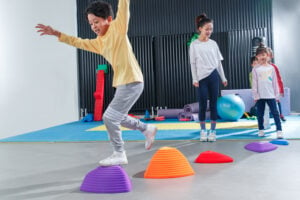
Core strength is the foundation for so many of the skills children use every day. From sitting upright in the classroom to climbing on the playground, kids rely on their core muscles for stability and control. Strong coordination helps them run, jump, balance, and complete self-care tasks with ease.
When these skills take extra effort, kids may appear restless at their desks, tire quickly during play, or struggle with everyday activities like buttoning a coat or catching a ball. The good news is that with the right strategies, children can strengthen their core and coordination in fun, engaging ways that carry over into school, play, and home life.
Why Core Strength Matters for Children
The “core” includes the muscles in the stomach, back, and pelvis that stabilize the body. When children have a strong core, they can sit upright, maintain balance, and coordinate movements more easily. Without this stability, even simple tasks like writing at a desk or standing in line can feel tiring.
Core strength also supports endurance for longer activities. For example, children with strong cores can sit through a classroom lesson without slouching, or climb playground equipment without quickly running out of energy. A stable core lays the groundwork for physical activity, learning, and participation in daily routines.
The Role of Coordination in Child Development
Coordination is the ability to move muscles smoothly and efficiently together. For children, coordination shows up in countless ways, like climbing on the monkey bars, riding a bike, or even cutting with scissors.
Good coordination allows kids to feel confident joining in with peers during sports, playground games, or classroom activities. On the other hand, difficulties with coordination can make children hesitant to participate, which sometimes affects their social confidence. Building coordination helps kids develop smoother, safer movements while giving them more opportunities to enjoy active play.
Signs Your Child May Benefit from Pediatric Therapy
Children learn new skills at different speeds, but sometimes core strength or coordination take longer to develop. Parents and teachers may notice that a child:
- Struggles to sit upright for long periods
- Slouches or leans on their desk often
- Trips or loses balance more often than peers
- Tires quickly during active play
- Finds self-care tasks like buttoning, zipping, or tying shoes very difficult
- Has trouble keeping up with friends in games or sports
Seeing these signs doesn’t mean your child is behind — it simply shows where extra help can build skills for smoother daily routines.
How Occupational Therapy Supports Core Strength and Coordination
Pediatric occupational therapy (OT) uses playful, interactive activities to increase the skills children need for independence and participation. Sessions are personalized for each child, so therapy feels motivating and fun while targeting important areas like strength, balance, and movement planning.
Building Postural Stability
Strong core muscles give children the stability they need for writing, learning, and playing. OTs may use activities such as crawling through obstacle courses, holding yoga poses, or balancing on a therapy ball. These exercises strengthen the trunk muscles so kids can sit upright longer, concentrate better in class, and enjoy active play without tiring quickly.
Improving Balance and Motor Planning
Balance and motor planning help children coordinate their movements smoothly and safely. In OT, kids might practice hopping games, walk across a balance beam, or follow a stepping stone path. These activities train the body to anticipate and adjust movements, making physical play and sports more enjoyable and less stressful.
Supporting Daily Activities
Everyday self-care tasks often require both core strength and coordination. OTs integrate practice with zippers, buttons, tying shoelaces, and using utensils into sessions. By strengthening these skills in a fun, supportive way, therapy helps children feel more independent during routines at home and school.
Encouraging Play-Based Learning
Play is at the heart of pediatric OT. Activities like climbing, animal walks, or playground games are built into therapy so children stay engaged while working on physical skills. This approach allows kids to strengthen their muscles, coordination, and endurance without it feeling like “work.”
What to Expect During Pediatric OT Sessions
At Sensational Development, sessions are interactive and child-centered. Therapists design interactive games and activities that address core and coordination goals while keeping therapy enjoyable. Examples may include:
- Balancing on therapy balls during a game
- Playing hopscotch or jumping sequences
- Crawling through tunnels or obstacle courses
- Practicing buttons and zippers during dress-up play
- Building and following multi-step obstacle courses
Parents are involved throughout the process. Therapists provide strategies and activities families can try at home, so children can practice their skills in everyday routines. This teamwork helps children carry over what they learn in therapy to school, play, and their home life.
When to Reach Out for Support
If you notice that your child consistently struggles with posture, balance, or coordination, it may be time to consider an occupational therapy evaluation. Early support can make a big difference, helping children strengthen their core and coordination before these challenges begin to impact learning or play more significantly.
Seeking guidance simply gives your child access to tools and strategies that make movement feel smoother and daily routines more manageable. With the right guidance, children can boost strength and coordination that aid success in school, at home, and on the playground.
Call Sensational Development for an Appointment Today
At Sensational Development, our occupational therapists use playful, evidence-based strategies to build children’s core strength and coordination. Therapy sessions are engaging, supportive, and tailored to each child’s unique needs.
With clinics in Massapequa and East Northport, NY, we partner with families to grow skills that last well beyond the classroom. If you’ve noticed your child struggling with posture, balance, or coordination, now is a great time to seek guidance. Together, we can help your child grow the skills they need for school, daily activities, and lifelong learning.
